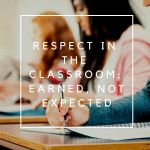If you’re looking for a new job, you know that the toughest part about finding a new job is the interview process. It’s intimidating enough to interview with just one person, but you’ll find that as a teacher, you’ll almost always interview with a panel of people. Unless you totally rock it, this teaching interview will not only serve as your first impression, but your last. Thankfully, you can do a lot to ensure success during your interview process.
Research. Make sure you research the school you intend to work at. You can glean valuable information from looking at the school’s website. Look at their mission statement, look at the school improvement plan if it’s posted, and definitely look at their test scores to see their strengths and what they need to work on. When you walk into the interview, you’ll more than likely get asked why you wanted to work at this school. If you want to answer intelligently, this information will assist you in answering the question.
Rehearse. Make sure you rehearse answering common interview questions. Knowing what you want to say ahead of time will make it easier to answer questions more fluidly when you get in front of a panel of people. Try getting someone you know to ask you questions that you might not think of so that you can ensure no one will trip you up during the interview process.
Dress for Success. It’s all about making a good impression, and you want to show that you’re a professional, so dress professionally. Do not go into an interview jeans and a nice shirt. Wear a suit if you’re male and a nice dress or slacks with a blouse if you’re female. Make sure you don’t under-dress or dress too provocatively. Dress like you want to work as a teacher if you want a teaching position.
Portfolio. If you haven’t created a portfolio yet, you should. Keep a binder with your Praxis scores, your license, evaluations, and samples of awesome things you’ve done in your classroom. It might help to take pictures of things you do throughout the year and print those as a future practice. When in an interview, nothing sparks your memory of the brilliant things you’ve done better than pictures. It also impresses your prospective employer, so that’s a bonus.
It’s All an Interview. Make sure that all throughout your process of gaining employment you exude confidence as well as good manners. That means smiling at and greeting the secretary in addition to thanking whoever helps you along the way. You want to impress the people at the school who interview you, but just know that when you walk away, the secretary will talk about you if you are rude. That’s not a first impression that will gain you access to the job. Every person you encounter holds importance when you walk into that school, so make sure you show off the best parts of your personality at all times.
Answer the Questions. Answer them completely, with examples when it applies, and don’t try to give cop-out answers. You may want to think prior to the interview, for example, about what your biggest weakness is. Job-Hunt gives a great suggestion for conquering the job weakness question. Give them a real weakness, followed by the way you minimize the impact of the weakness. Do not tell them you don’t possess any weaknesses because even Superman had Kryptonite, and you are not superhuman!
Smile. Interviews might not make you comfortable, but you don’t want them to see that. You want them to see confidence and lots of energy (because you’ll need both of those things to teach). Also, they need to see that you’re excited about coming to work with them, so if you’re frowning the whole time, you won’t give off the right impression. Plus, smiling makes everyone around you happy, and who better to make happy than the person you want to work for?
Ask the Right Questions. When you get the opportunity to ask questions, make sure ask questions that will show your employer that you have interest in the position. You should prepare in advance for the question “What questions do you have for us?” because you don’t want to ask about salary and benefits on the first interview. You want to ask questions about the position, the school (or school system), and the process (or next steps). You can ask them to tell you something about the job that isn’t in the job description, how long people usually stay in this position (or at this school), how they measure success in their employees, when they expect to make a decision, and/or who to stay in touch with about the job. You can ask many other questions, but make sure they relate to the job itself and not benefits if you want them to know you’re interested and have thought about this job.
Give Thanks. At the end of the interview, make sure you thank them for seeing you. You might also want to follow-up with a thank-you letter so that they remember you after the interview. It seems like an old-fashioned thing to do, but it’s a good strategy when you want to be the last person they think about and continue to show them you’re interested and invested in the position.
As teaching positions get cut back every year, many positions will have a multitude of people applying. You want to make sure you demonstrate your competence as a teacher, confidence, and a positive attitude. Hopefully these tips for rockin’ a teaching interview will help you at least with the confidence part of the interview.
Share your interview success stories or precautionary tales in the comments below!





